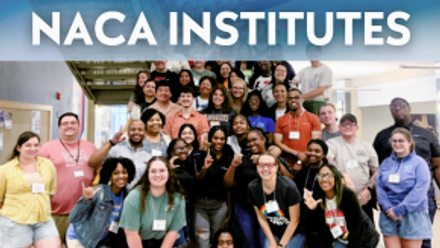NACA Statement on Recent Anti-DEI Legislation in Alabama
As the Association with a vision to create college communities where everyone belongs, we know there is much work to be done for college communities to truly become environments where everyone belongs. As such, diversity, equity, and inclusion are core values of the Association. NACA recognizes the diversity of all its members and supports the development and implementation of programs and services that achieve this goal as we work to actualize our vision.
NACA will host a conference in Birmingham, Alabama later this fall. Birmingham has a storied and painful history of fighting for civil and human rights. Legislation like SB129 should serve as a timely reminder that the fight for civil and human rights did not end with the passage of the Civil Rights Act of 1964 but persists today. While NACA is working closely with city partners to host a safe experience for attendees of all identities, we will not shy away from advancing our DEI competencies nor hosting education on DEI topics during the event for our attendees.
As we’ve previously stated, the Association has significant concerns about any legislation that limits or prohibits diversity, equity, and inclusion programs, activities, and initiatives on college campuses, and/or impedes the furtherance of inclusive and brave spaces for individuals with varying identities and/or lived experiences. NACA feels strongly that decisions about what programs hosted, or spaces created, on college campuses should be left to individual campus leaders and their students, as they are best suited to assess and address the needs of their unique campus community. Efforts to place restrictions on college campuses are not supported by the Association, especially those deemed integral to holistic student development.
While the Association has not prescribed to specific theoretical frameworks or methods for diversity, equity, and inclusion education, we believe in the importance of supporting programs and campus activities that further understanding and constructive dialogue on these topics that advance a variety of viewpoints and perspectives. Efforts that attempt to limit specific theoretical frameworks or methods are having the impact of silencing all conversations and are hindering students, organizations, and administrators from creating college communities where everyone belongs.
Creating college communities where everyone belongs does not mean advancing policies where everyone thinks alike, looks alike, or votes alike. Developing a sense of belonging, as NACA defines, means individuals feel their authentic self is personally accepted, respected, included, supported, and safe in the university environment. Creating college communities where everyone belongs means amplifying opportunities for inclusive learning and meaningful connections; moreover, it means advancing brave spaces for the free exchange of ideas, differing perspectives, challenging dialogue, empathy for others’ lived experiences, and acceptance.
Advancing Our Collective DEI Work
As you process through this most recent legislation, we encourage you to participate in upcoming Webinars with your colleagues focused on DEIA efforts and navigating campus issues:
- April 12 – Inclusivity of Individuals at Events
- April 17 – Associate Chat: What about Whiteness
- April 18 – DiversiTEA: From Woke to Work
- May 17 – Navigating Campus Issues as Students and Staff
We also encourage you to reference the Association’s Competencies for Diversity & Inclusion as a guide to develop one’s professional and personal growth. Some of our competencies speak to:
- Recognizing that individuals have multiple and intersecting identities, differing lived experiences, and varying perspectives and are not solely defined by any one of these;
- Understanding how we interact with systems of oppression, privilege, and power;
- Demonstrating awareness of inequitable and oppressive ways that laws and policies are enacted on vulnerable populations; and,
- Ensuring individuals have opportunities to engage in a variety of activities including and beyond those associated with their identities.
The Association has also adopted definitions to provide a baseline and framework to guide our work, as well as to assist professionals as they seek to increase awareness and facilitate diverse and engaged college communities.
- Diversity – the practice or quality of including, involving, understanding, and appreciating individuals within the context of, but not limited to, the social constructs of: race, gender identity, ethnicity, religion, nationality, documentation status, sexual orientation, socioeconomic status, along with physical and mental abilities and disabilities.
- Equity – an intentional, designâcentered approach and concept that promotes fair treatment, access, opportunities, resources, and advancement of all people while striving to eliminate barriers and disparities that may have prevented the full participation of a marginalized group.
- Inclusion – the implementation of accessible opportunities and resources and active, intentional, ongoing engagement and practice that empowers and promotes individuals to create a sense of belonging, support, cultural competence, and humility, with diversity as the core.
- Accessibility – the premise of minimizing the disadvantages by creating intentional space, means, and opportunities where individuals can feel empowered to acquire information, engage in the same interactions, and complete tasks in an autonomous and independent manner.
- Social Justice – the knowledge, skills, and dispositions needed to create learning environments that foster equitable participation. Social Justice also functions as a process to the revision of injustices that encompass, but are not limited to, human rights, access, participation & equity.
NACA is committed to using its mission, vision, core values, and competencies to create – with intention – environments and experiences where all people can thrive and be successful.




